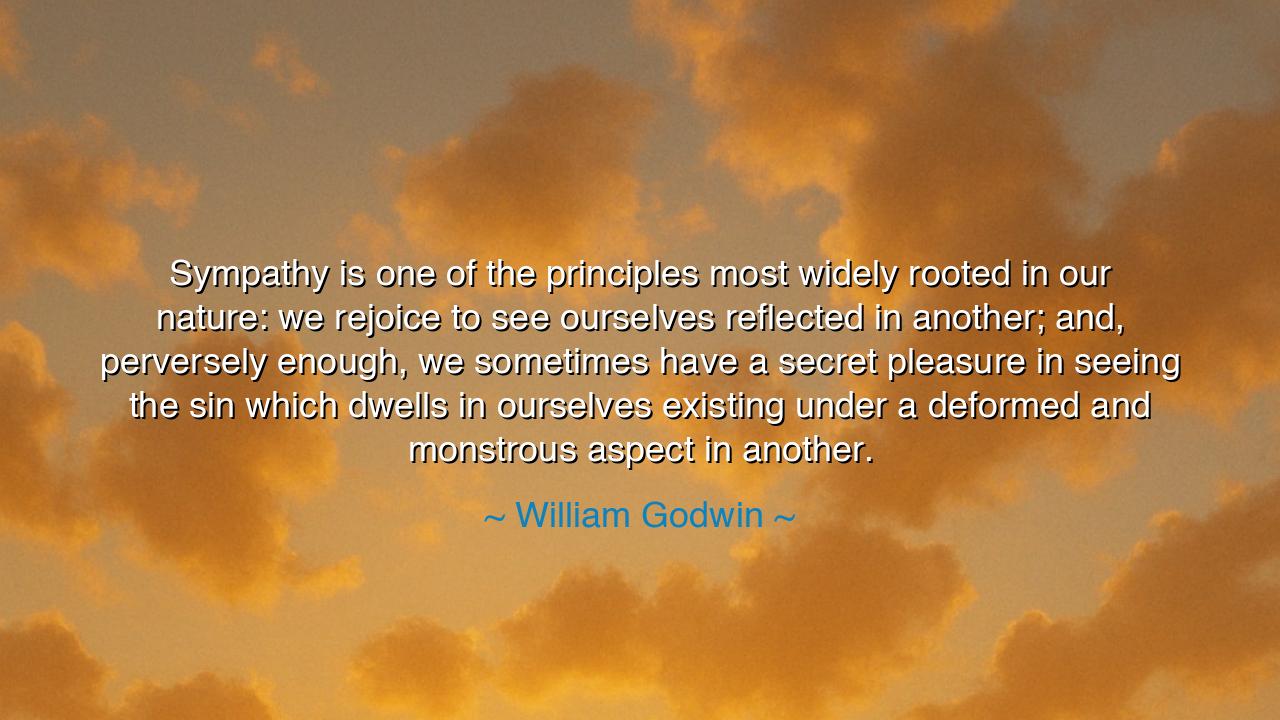
Sympathy is one of the principles most widely rooted in our
Sympathy is one of the principles most widely rooted in our nature: we rejoice to see ourselves reflected in another; and, perversely enough, we sometimes have a secret pleasure in seeing the sin which dwells in ourselves existing under a deformed and monstrous aspect in another.






When William Godwin declared, “Sympathy is one of the principles most widely rooted in our nature: we rejoice to see ourselves reflected in another; and, perversely enough, we sometimes have a secret pleasure in seeing the sin which dwells in ourselves existing under a deformed and monstrous aspect in another,” he was revealing a truth both noble and unsettling about the human heart. His words carry the weight of paradox: that sympathy, born of love and fellowship, can lift us toward virtue, yet can also turn dark, binding us through the recognition of our shared flaws and even drawing pleasure from their exposure in others.
At its highest, sympathy is the mirror of humanity. We delight when we find in another the reflection of our joys, our struggles, our sorrows. It is why we weep at tragedies and laugh at comedies: because in the stage or the page we see ourselves reborn. Godwin, a philosopher of human nature, understood that this shared recognition binds communities, families, and nations together. It is the invisible thread that makes the suffering of a stranger stir our own soul, and the triumph of another kindle our own heart.
Yet Godwin does not leave us in comfort. He warns that this same principle can be corrupted. We may take a perverse pleasure in seeing others fall, because their fall reflects our own hidden weakness. How often do men rejoice when a rival is exposed in vice, saying secretly, “I too have this fault, but now it is he, not I, who bears the shame.” This is the darker side of sympathy: not the sharing of virtue, but the secret communion of sin, where the sight of another’s corruption lessens the burden of our own.
History gives us countless examples. Recall the tale of the Pharisees, who brought before Christ the woman accused of adultery. Their hearts swelled with self-righteousness, but also with hidden delight. In her sin they saw reflected their own desires, but deformed, made monstrous, and safely placed upon her alone. They rejoiced to condemn her, for in her shame they found a strange release from their own. Yet the words of Christ—“He who is without sin among you, let him cast the first stone”—shattered this illusion, revealing the hypocrisy of such corrupted sympathy.
This paradox is deeply human. For we long to connect, whether in virtue or in vice. We rejoice when another shares our good, but also, strangely, when another embodies our hidden faults. Godwin’s wisdom lies in exposing this duality, so that we may recognize it within ourselves. Sympathy is indeed one of the most deeply rooted principles of our nature, but unless tempered with honesty and self-reflection, it may lead us to delight in the downfall of others rather than to rise together in love.
The lesson, O listeners, is to guard your heart. Rejoice in the reflections of kindness, courage, and joy you find in others. Let sympathy be the bond that uplifts, not the chain that drags both down. When you see another fall, resist the secret satisfaction that whispers, “I am not alone in my flaw.” Instead, let their fall awaken compassion, and stir in you the resolve to heal both yourself and them. In this way, sympathy regains its purity, becoming a force for mutual growth rather than mutual corruption.
Practical action is clear: practice awareness of your own hidden responses. When you see others suffer shame or sin, search your heart: are you taking pleasure in their downfall? If so, turn that energy inward, using it as a mirror for your own improvement. Celebrate not the sins reflected, but the opportunities for transformation they reveal. Direct your sympathy toward mercy, not mockery, toward restoration, not ruin.
Therefore, let Godwin’s words echo as both warning and guide: sympathy is the bond of humanity, yet it can be twisted into a shadow of itself. Use it rightly, and it will bind you in fellowship and compassion. Use it wrongly, and it will make you a silent conspirator in the sins of others. Choose the higher way: let your sympathy be not a dark delight in weakness, but a radiant joy in the shared pursuit of virtue. In this lies the true power of the human heart.






AAdministratorAdministrator
Welcome, honored guests. Please leave a comment, we will respond soon